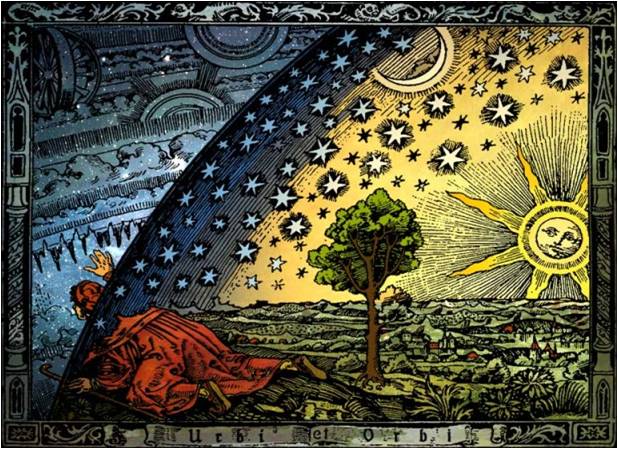David Russell Mosley
Lent
4 March 2014
The Edge of Elfland
Hudson, New Hampshire
Dear Friends and Family,
‘What I didn’t know about St Quentin was that its basilica is one of six important French church buildings which contain labyrinths, the best known of which is Chartres. The one at St Quentin follows the same pattern as Chartres, though is slightly smaller and based on an octagon rather than a circle, so its lines are straight and segmented rather than curved. But it is superior to Chartres in that it is always accessible to the public, whereas at Chartres the labyrinth is usually covered with chairs, and only cleared for walking on once a week. I have long been interested in labyrinths, and had even drawn up plans to build one in the theological college where I was on staff. So I took the opportunity to walk around it.’
Life as labyrinth from Psephizo
The Netherlands Bach Society is performing and recording the entire works of Bach. This one is probably my favourite, still being a Bach Neophyte.
‘While it’s true that we can know something about Bach from his music and that we can know something about God from his effects, in both cases our knowledge remains imperfect and incomplete. We can never attain comprehensive knowledge of God; we can only plunge further and further into his infinite intelligibility, and as a result we come to love him more and more truly. But God’s knowledge of us is comprehensive; he does know every single thing there is to know about us. He is, as St. Augustine said, “more inward than the most inward place of my heart and loftier than the highest.” Just as no one could ever know more about Bach’s music than did the composer himself, so no one can know us more deeply than can the Creator himself. We’re not just knowers, we’re known knowers. We’re not mere musicologists, outside observers examining these things from afar—we’re the music!’
MYSTERY AND MUSIC from Word on Fire
‘But it was this past November that one of my sons asked a question that I had (as far as I can recall) never thought of in the form he posed it: “Dad, okay, I get that God has no beginning, that he is the reason for his own existence, but this is what I still don’t get: Why does God exist? I mean, what’s his purpose for existing? And why is he love and not, like, meanness or something else? Oh, and if he’s really free, did he choose to come self-exist and be a Trinity?”’
WHY DOES GOD EXIST? From Word on Fire
‘The ISIS barbarians were actually quite right in entitling their video “A Message Written in Blood.” Up and down the centuries, tyrants and their lackeys have thought that they could wipe out the followers of Jesus through acts of violence. But as Tertullian observed long ago, the blood of the martyrs is the seed of the Church. And they were furthermore right in sending their message to “the Nation of the Cross.” But they should know that the cross taunts them.’
A MESSAGE IN BLOOD: ISIS AND THE MEANING OF THE CROSS from Word on Fire
‘”Adoption matters because it helps to get rid of a culture of death, and move against the practice of abortion, the practice of modern slavery and people trafficking. It can help avoid infanticide – most of us don’t know that hundreds of children in Holland are euthanised every year. It’s happening in modern Europe.”‘
John Milbank quoted on John Milbank: Adoption reduces abortion, human trafficking and infanticide from Christianity Today
‘Lent prepares us so that the seeming irregularity of the timing of Resurrection Sunday does not take us by surprise. As in the parable of the ten virgins (Mt 25:1-13), Lent is a time to make sure we have enough oil to keep our lamps lit until the bridegroom comes. It is the time of literal darkness in which we should cultivate our light. Since Easter’s timing seems so irregular, we are a bit like the virgins with the lamps—not entirely sure when the groom will arrive. Lent teaches us to tend our light.’
Scholar’s Compass: Lent and Easter’s Timing from Emerging Scholars Blog
‘”Sin is sin, but people live with different degrees of pressure and temptation. … No one knows for sure how hard temptation might bear on another. It is like Augustine exclaiming in exasperated compassion, when faced with Pelagian teachers who insisted that all sin was a fully conscious rejection of God, “Most sins are committed by people weeping and groaning.” A temptation that might seem trivial to you could be crushing to another; an obsession that haunts you day and night may be incomprehensible to someone else. … everyone comes from a different past, with different memories and abilities.” (Where God Happens, p 40)’
Rowan Williams quoted on Lenten Wisdom From the Desert Day 9 from And There Is Every Quest
If you have any interest in living in a monastic type community, for, oh, say, a year, then I highly encourage you to apply for the Community of St Anselm. This yearlong monastic community project is being done by the Church of England and will be headed up by the Archbishop of Canterbury, Justin Welby. Definitely check it out, even if you’re not Anglican.
Apply now to spend a year in God’s time
Why Study the Gift with John Milbank and Simon Oliver at the University of Nottingham.
Sincerely yours,
David










